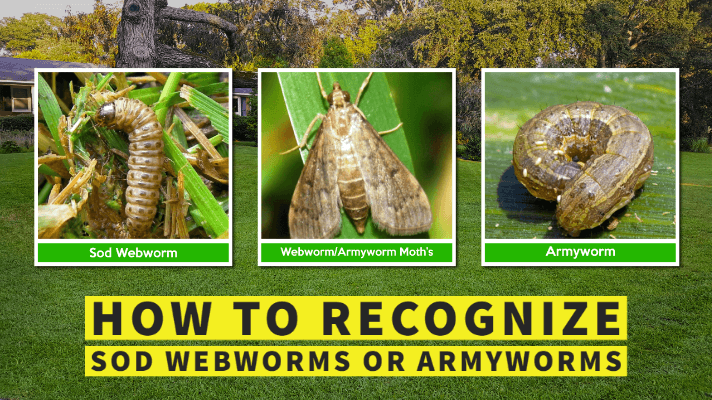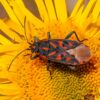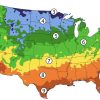Sod webworms – Oklahoma’s Worst Lawn Pest and How to Fight Them

Sod webworms in Web
Sod webworms are the larvae of moths that feed on the leaves of grass, causing it to turn brown and die. They are small, creamy white worms with brown or black heads that are typically found in the thatch layer of grass. Sod webworms are often mistaken for cutworms or armyworms, which are also pests that can damage lawns.
Sod webworms are most active during the summer months and are more commonly found in areas with warm, dry climates. They are often attracted to grass that is stressed or weakened by other factors, such as drought or improper fertilization.
If you suspect you have a sod webworm infestation in your lawn, you may notice small, brown patches of dead grass or an increased number of moths flying around at dusk. To control sod webworms, you can try applying a natural or chemical insecticide according to the label instructions. It is also important to water and fertilize your lawn properly to help it remain healthy and resistant to pests. If the infestation is severe, it may be necessary to reseed or re-sod the affected areas.

Example of lawn damage caused by webworms
What times of the year are sod webworms active?
Sod webworms are most active during the summer months, when the weather is warm and dry. They are typically found in areas with warm, dry climates and are attracted to grass that is stressed or weakened by other factors, such as drought or improper fertilization.
In most areas, sod webworms are most active from late spring to early fall. However, the specific timing can vary depending on the region and the specific species of sod webworm present. Some species may be more active earlier in the season, while others may be more active later in the season.
If you suspect you have a sod webworm infestation in your lawn, you may notice small, brown patches of dead grass or an increased number of moths flying around at dusk. To control sod webworms, it is important to identify and address the underlying causes of stress or weakness in your lawn, as well as to apply a natural or chemical insecticide according to the label instructions.

Close View of a sod webworm
Are there any natural methods of fighting sod webworms?
There are several natural control methods that may be effective in fighting sod webworms:
- Maintain a healthy lawn: A healthy lawn is more resistant to pest infestations, including sod webworms. To keep your lawn healthy, water it deeply and consistently, fertilize it properly, and mow it at the recommended height for your grass type.
- Use natural predators: Certain types of birds, such as sparrows and robins, will eat sod webworms and can help to reduce their numbers. You can also encourage these birds to visit your lawn by providing bird feeders or by planting native plants that produce seeds or berries that they like to eat.
- Apply nematodes: Nematodes are small, beneficial worms that can be applied to your lawn to control sod webworms. These worms are natural predators of sod webworms and will attack and kill them.
- Use a natural insecticide: Insecticides made from natural products, such as Bacillus thuringiensis (Bt), spinosad, or pyrethrins, can be effective in controlling sod webworms and are generally safer for humans, animals, and the environment than synthetic insecticides.
It is important to note that natural control methods may take longer to be effective than chemical insecticides, and may not always provide complete control of the pest. In some cases, it may be necessary to use a combination of natural and chemical control methods in order to effectively manage a sod webworm infestation.
What pesticides work best on Sod webworms?
There are a number of pesticides that can be effective in controlling sod webworms. Some options include:
- Insecticides containing Bacillus thuringiensis (Bt): Bt is a naturally occurring bacteria that is toxic to certain insects, including sod webworms. It is safe for use around humans and animals and breaks down quickly in the environment.
- Insecticides containing spinosad: Spinosad is a natural insecticide made from fermented soil bacteria. It is effective against a wide range of insects, including sod webworms, and is safe for use around humans and animals.
- Insecticides containing pyrethrins: Pyrethrins are natural insecticides derived from chrysanthemum flowers. They are effective against a variety of insects, including sod webworms, and break down quickly in the environment.
It is important to read and follow the label instructions carefully when using any type of pesticide, as improper use can harm humans, animals, and the environment. Pesticides should only be used as a last resort, after other control methods have been tried and proven ineffective.




